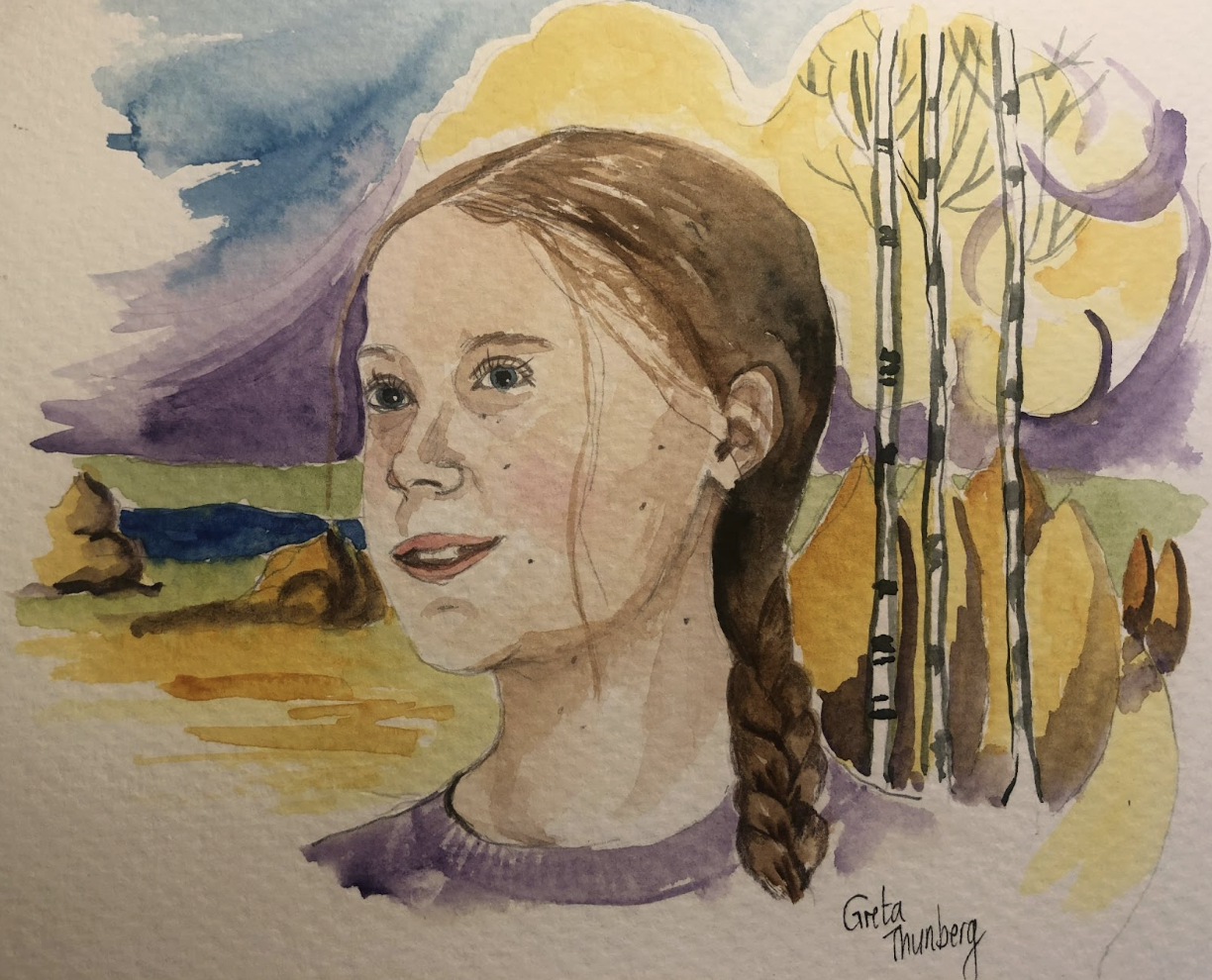
Trump, Fascism, and What Artists Can Do
April 25, 2025
Permanent Offense
April 25, 2025Weekend Reading on Women’s Representation is a compilation of stories about women’s representation in politics, on boards, in sports and entertainment, in judicial offices and in the private sector in the U.S. and around the world—with a little gardening and goodwill mixed in for refreshment!
Earth Day 2025—’Our Power, Our Planet’—and Other Feminist Milestones
Earth Day was on Tuesday, April 22! The official theme of Earth Day 2025 is “Our Power, Our Planet,” calling for individuals to advocate for climate solutions and renewable energy at every level of government. 2025 is the 55th anniversary of Earth Day; what has become an international commemoration in 192 countries began as a grassroots movement to call attention to the dangers of climate change and the crucial need to protect our planet. Governments and large corporations across the globe are rolling back key environmental protections, policies and legislation, leaving it up to individuals and local communities to create positive change.

Now more than ever, women view climate change as the top political issue individuals face. This tracks with research from U.N. Women, which finds that the effects of climate change are disproportionately impacting women and girls. Furthermore, gender-based violence increases in communities that have experienced a recent climate disaster:
Every 1°C rise in global temperature is associated with a 4.7 per cent increase in intimate partner violence (IPV), the study cites.
As the time allotted on the global climate clock tracks downward, we in the United States and across the world must change our voting habits to elect more women and enact stronger policies to protect our natural world.
The Gender Parity Lifeline highlights the intrinsic link between achieving gender parity and making a transformative investment to slow climate change. Until parity is achieved, women activists across the globe are taking action to transform local food systems, hold legislators accountable, invest in renewable energy, start green businesses, and so much more to protect our planet.

Other milestones for women this week include: Nebraska ratifying a bill granting women’s suffrage in municipal elections in 1917, Barbara Walters becoming the first woman nightly news anchor in 1976, and Chloe Zhao becoming the first woman of color and the first woman of Asian descent to earn best director at the Academy Awards (2021).
Birthdays to celebrate include: Sarah Bryner, director at Public Agenda; Maria Perez, co-director of Democracy Rising; songwriter and activist Ella Fitzgerald; Patti Russo, ED of the Women’s Campaign School at Yale; Julia Ruutila, union organizer, activist and journalist (1907); civil rights leader Coretta Scott King, and Mary Wollstonecraft, author of A Vindication of the Rights of Women (1759).

Barbara Lee Wins Oakland Mayoral Special Election with Ranked-Choice Voting

Before using ranked-choice voting in 2010, Oakland had never elected a woman as mayor. That year, Jean Quan became the city’s first woman mayor, and this month, former U.S. Rep. Barbara Lee won a convincing win in a ranked-choice voting election to become the fourth consecutive woman elected as mayor and the first-ever Black woman mayor. Cara McCormick covered Lee’s win for Independent Voter News:
This marks the fifth mayoral election conducted with RCV since Oakland adopted the system in 2010 with 69% of the vote. The voting method is now a familiar part of civic life in the city, just as it has also become familiar for nationally recognized leaders to seek the mayoralty..
Lee’s win reflects not just strong first-choice support, but a broad coalition built through strategic outreach and positive campaigning. In the final days of the race, Lee released a video outlining a ranked choice voting (RCV) strategy, officially urging her supporters to rank multiple names on their ballots. In the video, Lee encourages voters to rank her as their number one choice, followed by Renia Webb, Suz Robinson, Elizabeth Swaney, and President Cristina Grappo in the second through fifth slots.
“These are folks who don’t just talk the talk; they walk it — boldly and with integrity,” Lee says. “They’re in it for the people, not the politics.” She describes the group as “incredible, values-driven candidates….. “Oakland deserves a little more light, a little more laughter, and a whole lot more love,” she adds.
Lee’s campaign was widely praised for its positive tone. Advocates of RCV say her success showcases how ranked choice voting rewards coalition-building and discourages negative campaigning.
FairVote looked under the hood in how voters used ranked-choice voting: Among the candidates who didn’t rank Lee or her strongest challenge first, 85 percent indicated a backup choice, with the great majority of them having their ballot count in the final round.
Developments for Women Candidates in Mayoral Races in New York City and Minneapolis
Many cities are holding mayoral elections this year. RepresentWomen is keeping a particularly close eye on New York City and Minneapolis, which have ranked-choice voting. In New York City, men lead in the polls in the likely decisive Democratic primary for mayor, but city council speaker Adrienne Adams “shook up the race” this week, according to The New York Times, when she picked up three major union endorsements and the endorsement of New York Attorney General Letitia James:
The New York Daily News focused on how the city’s largest union embraced RCV by endorsing three candidates in order of preference:
DC 37, New York City’s largest municipal union, is endorsing City Council Speaker Adrienne Adams as its top pick for mayor, giving her a big boost as her campaign has struggled to gain momentum since she launched her run last month. The powerful union, which represents about 150,000 active city workers and nearly 90,000 retirees, is also urging members to rank Queens Assemblyman Zohran Mamdani No. 2 and Brooklyn state Sen. Zellnor Myrie No. 3 on their Democratic mayoral primary ballots in June.
“We’re proud to endorse these pro-worker candidates in the June primary and look forward to getting out the vote in support of their campaigns,” DC 37 Executive Director Henry Garrido said in a statement late Tuesday. “At a time when workers’ rights are being ripped apart at the federal level, it’s more important than ever to elect local candidates who will fight for working families and the services we all rely on.”
Meanwhile, a WCCO Radio report in Minneapolis underscores that RCV alone cannot overcome all barriers women can face on the campaign trail.
Minneapolis City Council member Emily Koski announced Monday morning that she will not continue her bid to unseat current Mayor Jacob Frey, saying under the current political climate, she can’t “be her authentic self and be a candidate.”
In a written statement, she also lamented the influence of anonymous donors and political action committees which she says are diverting focus from the real issues. Koski adds the balance of being a mother and a candidate to represent the largest city in Minnesota was too much.
Picture Tells a Thousand Words: All Men at the Table Negotiating the Ukraine War
The Trump administration has embraced Russian President Vladimir Putin’s approach to ending the war in Ukraine. As The New York Times reports,
“President Trump lashed out at President Volodymyr Zelensky of Ukraine on social media on Wednesday after he rejected U.S. terms to end the war with Russia. ‘He can have Peace or he can fight for another three years before losing the whole Country,’ Mr. Trump said. Vice President JD Vance had called on Ukraine to accept an American proposal that closely mirrored long standing Russian demands.”
The organization Her Bold Move flagged a harsh reality in an email this week:
“Here’s a picture of the folks involved in those high-level ‘peace’ talks in Paris: You might notice everyone in that photo has a few things in common… At Her Bold Move, we can’t help but notice that these meetings – arguably the most important meetings in the world – had zero women in attendance.”
Her Bold Move describes its mission as:
“In states across the country, majority-male GOP legislatures (led by male GOP governors) are passing laws that infringe upon women’s health, safety, and rights to bodily autonomy. The work we do today is especially critical because most of the people making these decisions about abortion access ARE MEN. Men account for 73% of the elected officials in the U.S. government. Her Bold Move is on a mission to change that. We’re here to elect unapologetically pro-choice women and shatter every glass ceiling that still exists in our government. We are laser-focused on electing women to seats that have historically only been held by men, and women of color to seats that have never been held by a woman who looks like them.”
Rare Open Seat in Illinois for U.S. Senate Offers Opportunity for a Woman Candidate
Long-time Illinois U.S. Sen. Dick Durbin has announced he will not seek reelection in 2026 after three decades in office. The 80-year-old Durbin, the second-ranked Democrat in the Senate, said in a video release:
“I truly love the job of being a United States senator. But in my heart, I know it’s time to pass the torch.”
The New York Times was among outlets lifting up prospective Democratic candidates in this strongly Democratic state, with three being women:
“Several Illinois Democrats have indicated an interest in running if the seat opened up and have been readying for a potential candidacy. They include Representatives Lauren Underwood, 38; Raja Krishnamoorthi, 51; and Robin Kelly, 68, along with Lt. Gov. Juliana Stratton, who is 59.”
Having a woman elected in Illinois may be critically important for women holding onto their current 26% share of the U.S. Senate. In New Hampshire, Jeanne Shaheen will not seek re-election, and Democrats are coalescing around Congressman Chris Pappas’s bid – the likely favorite even if Republicans nominate Lily Tang Williams.
Congressional Demographics for Women’s Representation by Age Cohort Shows How Far We Are from Gender Balance
As we think about women in the U.S. Senate, it’s a good reminder of how far we are from gender balance. To be sure, 26 seats are far more than the two seats women held in 1992. But it’s a long way from 50, and patterns of representation by age are not encouraging. The invaluable Inter-Parliamentary Union provides data on women in the U.S. Senate by age cohort. Among the 37 Senators who are 60 and under, women hold only 7 seats. That pattern holds for the youngest Senators: of 11 who are 50 and under, nine are men. That’s a worse ratio than the 45-18 breakdown for Senators over 60.

The IPU also reports that the average age of Senators after the 2024 elections was 63.9 – the third oldest age among all legislative bodies in the world, where it reported data behind only the Cambodian lower house and Cameroon senate. The U.S. House isn’t much better, where the average age of representatives earlier this year was 57.7, far older than the average ages under 50 in nations like France, Denmark, New Zealand, and the United Kingdom. The IPU data shows that younger women are doing better in the House than their Senate counterparts, although outnumbered among representatives under 40 by 21-15 and by a whopping 63 to 23 among House Members 41 to 50.
Upcoming Philippines Elections Underscore the Need for Progress for Women
On May 12, the Philippines will hold midterm elections for its national legislature and thousands of down-ballot races. Women make up 28 percent of Parliament, just behind the U.S. in the IPU rankings—85th to the USA’s 78th. Here is the IPU page on the country, and here’s a March 31 story in Rappler about efforts to inject women’s concerns into the election.
Advocates call on 2025 candidates to push for women-centric laws: A coalition of women’s rights organizations on Monday, March 31, called on Senate and House hopefuls in the 2025 elections to advance measures pushing the rights of women and youth…The 10-point agenda captures the intersections of the many ways women are put at a disadvantage in society, from the world of work, to possibilities of violence, to the compounding threats when a woman is either an environmental defender or a victim of a disaster…
Progressive measures advocating for women and gender rights such as the divorce bill and the SOGIE equality bill have historically been excluded from top priority agenda.
Jean Franco, University of the Philippines political science professor and EveryWomanconvenor, said this is because women’s voices remain largely invisible in society. “‘Politicians don’t know how women vote. So when they release their platforms — if they do have platforms — these are usually for the general public.)”
Franco said there needs to be more data on how women vote, together with their concerns, in exit polls.The advocates noted that the campaign for the measures they laid out will be a long battle, but that they will persevere.
As Canada Heads to the Polls, Gender Gap in Political Leadership Persists

Canadians will vote in the federal election next week. The country’s political leadership remains male-dominated, with no woman ever elected prime minister. Research challenges stereotypes that women are too emotional to lead effectively, showing instead that women leaders are often more emotionally steady and supportive, especially during crises like the COVID-19 pandemic.
Check out RepresentWomen’s North America Country Brief for strategies to increase opportunities for women to run and win political office in Canada.
The Conversation reports:
All of Canada’s major political parties are currently led by men, and Canada has never elected a woman as prime minister. Kim Campbell briefly held the office in 1993 after Brian Mulroney’s resignation as leader of the Progressive Conservative Party. Her short tenure ended with a historic electoral defeat for the Conservatives.
With global tensions rising and Canada facing unprecedented uncertainties, it may seem easy to overlook the lack of women on election ballots. But strong, inclusive leadership is a practical necessity in these uncertain times.
A growing body of research and real-world examples are challenging longstanding assumptions about what makes an effective leader. In times of crisis, traditional leadership styles marked by dominance and rigidity — usually associated with men — often fall short.
Instead, leadership styles marked by empathy, flexibility, and open communication — usually associated with women — are proving to be both effective and essential. This kind of leadership helps steady teams when emotions run high and the path forward is unclear — exactly the kind of qualities Canada may need in the near future.
Ranked-Choice Voting: A Bridge to Proportional Representation

The United States electoral system needs reforming, and implementing ranked-choice voting (RCV) is one of the many ways we can ensure a more representative, functional democracy. RCV is growing in popularity nationwide, increasing the number of voters familiar with ranked-ballot systems. As that familiarity grows, RCV can serve as a stepping stone to proportional representation (PR), an election system commonly used in Europe and Latin America to elect candidates.
Eveline Dowling writes in DemocracySOS:
According to these data, RCV has the highest transfer of support for PR compared to the other two election reforms, national popular vote and non-partisan redistricting. In this sense, RCV can provide a transitional reform. RCV is often seen as less radical than full PR and can be implemented without restructuring legislative bodies. It’s an easier reform to advocate for in the short term. Once RCV is implemented and its benefits are clear, the conversation can shift to proportional representation, building on the success of incremental change.
Achieving Gender Parity in Texas

The Lone Star Parity Project recently released its State of the Woman biennial report tracking gender parity in local Texas politics. This report covers how many women filed to run for office in the first place, which elected offices have the most women serving, which counties elect the most women, and how many women win their primary elections in contested and uncontested races, among other key metrics regarding women’s representation.
Texas ranked 46th in the nation on its proximity to gender parity, according to RepresentWomen’s 2024 Gender Parity Index. Even though Texas ranked in the bottom five states, there were still several milestones in women’s representation, including electing the first openly gay member of Congress from a Southern state (Julie Johnson, CD-32), the youngest member of the Texas House of Representatives (Caroline Fairly, TX HD 87), and the first Latina tax assessor in Harris County, Annette Ramirez.
Brenda Valdivia interviewed Adrianna Maberry, the co-founder and research director of the Lone Star Parity Project, on the Houston PBS Passport. Give it a listen!
Feminists Gather in Portland

This week I attended More Equitable Democracy’s gathering in Portland, Ore., to learn more about the new government structure and voting system. Last year the city increased the number of seats on the council, created four three-seat districts, and adopted a proportional ranked-choice voting system to elect council members. Only 10 women had ever served on the city council until last year and now women hold 50 percent of seats!



Great Job Cynthia Richie Terrell & the Team @ Ms. Magazine Source link for sharing this story.





